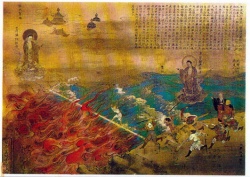Difference between revisions of "Nan-yüeh"
| Line 1: | Line 1: | ||
[[File:Url.jpg|thumb|250px|]] | [[File:Url.jpg|thumb|250px|]] | ||
<poem> | <poem> | ||
| − | Nan-yüeh | + | [[Nan-yüeh]] |
[[南岳]] (515–577) (PY [[Nanyue]]; Jpn [[Nangaku]]) | [[南岳]] (515–577) (PY [[Nanyue]]; Jpn [[Nangaku]]) | ||
| − | Also known as Hui-ssu. T'ient'ai's [[teacher]] and the | + | Also known as [[Hui-ssu]]. [[T'ient'ai's]] [[teacher]] and the [[third patriarch]] of the [[T'ient'ai]] school in [[China]], in the [[tradition]] that counts [[Nagarjuna]] as the school's founder. A native of [[Nan-yü-chou]] in {{Wiki|north}} [[China]], he entered the priesthood in 529 and [[concentrated]] on the study of the [[Lotus Sutra]]. Later he learned from Hui-wen the [[meditation]] for observing the [[mind]] and mastered the [[Lotus]] [[meditation]], a [[meditation]] based on the [[Lotus Sutra]]. In 548 a malicious priest who had opposed [[Nan-yüeh]] in [[debate]] poisoned him, and he nearly [[died]]. In 553 another rival priest poisoned him. He survived this attempt, too, and in the next year moved to[[ K'ai-yüeh-ssu]] [[temple]] in [[Kuang-chou]] where he lectured on the [[Great Perfection of Wisdom]] [[Sutra]]. In 555 he moved to [[Mount Ta-su]] in [[Kuang-chou]]. There he devoted himself to lecturing on the [[Wisdom]] and the [[Lotus sutras]] and engaged in the practice of the [[Lotus Sutra]] and the training of his [[disciples]]; one of those [[disciples]] was [[T'ient'ai]]. In 568 he moved to [[Nan-yüeh]], the mountain after which he gained the [[name]] the [[Great]] [[Teacher]] Nan-yüeh, and received the title great [[meditation master]] from the [[emperor]]. His works include The [[Mahayana Method of Concentration and Insight]] and On the [[Peaceful]] Practices of the [[Lotus Sutra]]. |
</poem> | </poem> | ||
{{R}} | {{R}} | ||
Revision as of 02:12, 18 September 2013
Nan-yüeh
南岳 (515–577) (PY Nanyue; Jpn Nangaku)
Also known as Hui-ssu. T'ient'ai's teacher and the third patriarch of the T'ient'ai school in China, in the tradition that counts Nagarjuna as the school's founder. A native of Nan-yü-chou in north China, he entered the priesthood in 529 and concentrated on the study of the Lotus Sutra. Later he learned from Hui-wen the meditation for observing the mind and mastered the Lotus meditation, a meditation based on the Lotus Sutra. In 548 a malicious priest who had opposed Nan-yüeh in debate poisoned him, and he nearly died. In 553 another rival priest poisoned him. He survived this attempt, too, and in the next year moved toK'ai-yüeh-ssu temple in Kuang-chou where he lectured on the Great Perfection of Wisdom Sutra. In 555 he moved to Mount Ta-su in Kuang-chou. There he devoted himself to lecturing on the Wisdom and the Lotus sutras and engaged in the practice of the Lotus Sutra and the training of his disciples; one of those disciples was T'ient'ai. In 568 he moved to Nan-yüeh, the mountain after which he gained the name the Great Teacher Nan-yüeh, and received the title great meditation master from the emperor. His works include The Mahayana Method of Concentration and Insight and On the Peaceful Practices of the Lotus Sutra.
